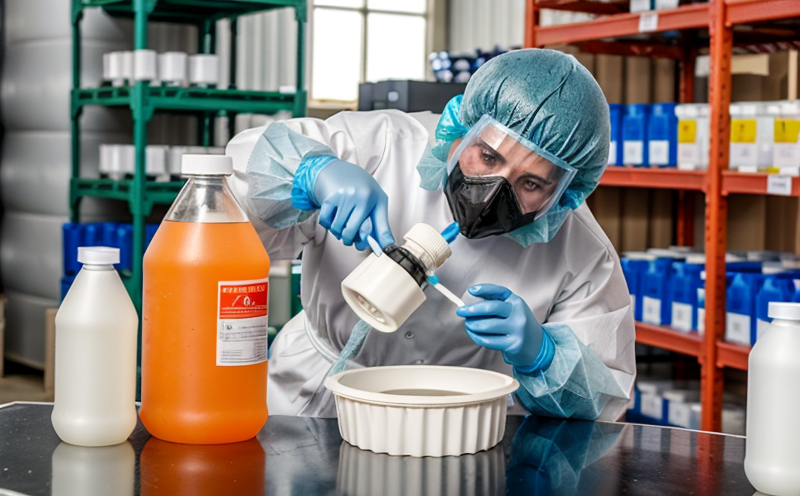ISO 11137 Sterilization and Microbiological Testing of Packaging Materials
The ISO 11137 series of standards provides a comprehensive approach to ensuring the sterility of medical devices, pharmaceutical packaging, and other critical products. One essential component within this framework is the microbiological testing of packaging materials used in these sectors. This service ensures that packaging does not harbor microorganisms that could compromise product integrity or safety.
The ISO 11137 standard addresses the sterilization process and subsequent microbiological testing to confirm the sterility of a packaged item, including its container and closure system. The testing is particularly important for ensuring that medical devices, pharmaceuticals, and other products remain free from contamination during storage, transport, and use.
Microbiological safety testing focuses on several key areas:
- Contamination control
- Biological load assessment
- Sterility assurance
The testing protocol involves a series of steps that include the following:
- Sampling: Representative samples are taken from the packaging material under test.
- Culture Media Preparation: Appropriate culture media is prepared to facilitate the growth and identification of microorganisms.
- Biological Indicator Test: A biological indicator (BI) is placed in a test sample, incubated, and evaluated for the presence of viable spores.
- Aerobic Plate Count: Samples are plated on aerobic media to count colony-forming units (CFUs).
- Fungi and Yeast Count: Samples are plated on fungal media to enumerate these organisms.
- Microbial Limit Test: This test checks for the presence of specific microorganisms that could be harmful or detrimental to the packaged product.
The results of these tests provide critical data that can inform decisions regarding the suitability of packaging materials for use in sterile environments. Compliance with ISO 11137 is not only essential for regulatory compliance but also for ensuring product safety and quality.
Our laboratory employs advanced microbiological testing equipment and adheres strictly to the guidelines set forth by ISO 11137, ensuring accurate and reliable results. The process begins with stringent sampling protocols that are designed to minimize contamination risks during sample collection.
The testing process is rigorous and involves multiple stages:
- Incubation: Samples are incubated under controlled conditions to allow for the growth of microorganisms, if present.
- Identification: Once growth occurs, the organisms are identified using various methods such as biochemical tests and molecular techniques.
- Data Analysis: The results from each stage are analyzed to ensure that the packaging material meets the required sterility criteria.
The ultimate goal of this service is to provide a high level of confidence in the safety and efficacy of packaged products. By adhering to ISO 11137, we help our clients meet regulatory requirements and enhance their product's marketability.
In summary, the ISO 11137 sterilization and microbiological testing of packaging materials is a crucial step in ensuring that medical devices and pharmaceuticals remain free from contamination. This process involves meticulous sampling, rigorous testing, and stringent analysis to provide accurate results that can be relied upon for regulatory compliance and product safety.
Benefits
The ISO 11137 sterilization and microbiological testing of packaging materials offers numerous benefits:
- Enhanced Product Safety: By ensuring that packaging is free from microorganisms, the risk of contamination during storage and use is minimized.
- Regulatory Compliance: Adherence to ISO 11137 ensures compliance with international standards, facilitating easier market access.
- Quality Assurance: The testing process provides a high level of confidence in the quality and safety of packaged products.
- Competitive Advantage: Meeting rigorous standards can enhance a company's reputation and competitive standing.
The service also contributes to operational efficiency by identifying potential issues early, thereby reducing the need for costly recalls or rework.
In addition to these direct benefits, the ISO 11137 testing process supports broader quality management systems that are essential for maintaining consistent product quality and safety.
Industry Applications
The ISO 11137 sterilization and microbiological testing of packaging materials finds application in various industries, including:
- Medical Device Manufacturing: Ensuring that devices are packaged in a way that maintains their sterility.
- Pharmaceuticals: Maintaining the integrity of drug products during transport and storage.
- Biotechnology: Protecting biologics from contamination during development and production.
The testing process is equally important in food packaging, where ensuring sterility is critical for maintaining product safety and quality. Additionally, it plays a vital role in the aerospace industry, where the integrity of components must be maintained under extreme environmental conditions.
In each of these sectors, the ability to ensure that packaging materials are free from microorganisms is crucial. The testing process not only ensures compliance with regulatory requirements but also enhances product safety and quality, contributing to a higher level of trust among consumers.
Environmental and Sustainability Contributions
The ISO 11137 sterilization and microbiological testing of packaging materials contributes positively to environmental sustainability by:
- Promoting Safe Disposal Practices: Packaging that is free from microorganisms can be disposed of safely without risking contamination.
- Minimizing Waste: By ensuring the integrity of packaged products, the need for reprocessing or replacement due to contamination is reduced.
- Saving Resources: Effective packaging minimizes the risk of spoilage and waste, thereby optimizing resource use.
The testing process also supports sustainable manufacturing practices by identifying potential issues early in the production cycle. This proactive approach reduces the environmental impact associated with product recalls and rework.
In addition to these direct benefits, the ISO 1137 series of standards promotes a culture of continuous improvement within organizations, encouraging them to adopt more environmentally friendly practices throughout their operations.





